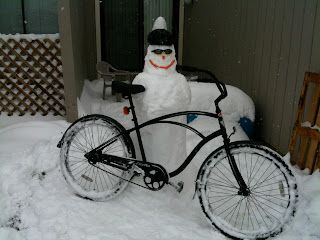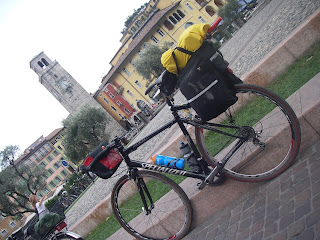Monday, April 29, 2013
Never stop learning
This past weekend, I had the opportunity to do a beginners cycling clinic for a group of woman here in Fort Collins. The weather cooperated perfectly with warm days, dry roads and gentle breezes. During the 2 1/2 days the main focus was on improving their bike handling skills along with being more comfortable when seated on the bike. By using a combination of lecture, focussing on proper biomechanics/bike fit and a variety of riding drills in an empty school parking lot, they soon were ready to take to the roads for more. Riding in traffic in a small bike lane or no bike lane, can be both frightening and intimidating, but by practicing their new skills they did just fine. The last day culminated with a short climb and descent of the south dam at Horsetooth Reservoir.
All of these woman made a choice to learn something new. This required them to get out of their comfort zone in order to get the most out of the experience. For some that meant taking a hand off the handle bar, or shifting gears. For others, riding with a group of people both in front, beside and behind you was a whole new experience. I would be safe in saying that it was probably more mentally fatiguing than physically as we did cover a lot of information.
So, get out on your bike as the days get longer, take a few minutes each ride, even if you are an experienced rider and just work on a few basic skills. Or better yet, if you are experienced and you see a beginner struggling, extend yourself and offer a little help. We all started with training wheels at one time and last time I checked, put on our cycling shorts one leg at a time too!
Keep the rubber side down,
Coach Eric
Monday, April 22, 2013
Maximize your training
Training
for any sport or fitness goal requires a time commitment. It can be a
difficult balancing act just to get all of the physical training requirements
and sleep, while still having a functional work and personal life in the weeks
and months leading up to a race. A nutrition and hydration strategy must be
implemented for training sessions to optimize performance and post exercise
nutrition needs to be monitored to help speed up recovery time & maintain a
healthy body. Of course, the dedicated athlete should also be engaged in
a year round core, strength and flexibility program. Now, factor this all
into a busy life of work, family, school, etc. and those 24 hours we are given each
day quickly disappear. Given the
limited amount of time one has to train some days, what can an athlete do to
maximize that time?
One
of the most effective ways for the time crunched athlete to improve performance
and decrease potential injuries is to implement a post-exercise mobility and
flexibility program.
Here
is a scenario as coaches we see far too often after a workout. Rob the
runner has just finished his favorite cross-country training session on the
Pineridge trails. He quenches his
thirst with something to drink, scrolls thru his mile splits on his watch and
is elated to see he has set a PR on this course. Then he hops in the car and drives away. Now, this all
sounds good, but Rob is missing one very key component to not only his
training, but also overall body health.
He neglected the opportunity to properly cool down and spend a few
crucial minutes on flexibility when the muscles are warm to minimize stiffness
and tightening up.
What
parts of the body should you focus on after a training session or race? First,
target the primary muscle groups used during that workout. Next, move towards
other areas of your body that are feeling tension. How long to hold a
stretch depends on the individual needs of the athlete. Some stretches are held
for 10-15 seconds, others as long as 2 minutes. Consulting with a fitness
specialist can help you determine not only what muscle groups you should be
targeting and the best way to do that, but also what muscles may need
strengthening to maintain a balanced body.
The
goal of a post workout program is to help return the muscles and joints to
their normal range of motion and reduce any tension, while allowing the body to
cool down as heart rate & body temperature return to normal resting
levels. This is also important preparation
for your next training session as the cool down allows the body to continue
removing waste from the muscles. So, if you are one of the many time
crunched athletes, remember you will get more benefit from shortening your
workout by 5-10 minutes and using those extra minutes to properly cool down and
do some flexibility and mobility exercises. Last but certainly not
least....stretching just feels good! So, make a little time every day
even if you didn’t exercise to just stretch it out.
Monday, April 15, 2013
You and the Clock
Being an athlete requires one to make good use of their time, often multi tasking when every possible to get a much out of those 24 hours each and every day. Take for example a triathlete who must balance training for the 3 sports of swimming, biking and running along with family, relationships, work, sleep, etc... when not training. Here are the 4 most common race distances triathletes participate in and some race duration ranges for age group athletes.
Sprint - 500-750 meter swim, 20K bike and 5K run 1-2 hours
Olympic - 1.5K swim 40K bike, 10K run 2-4 hours
1/2 Ironman - 1.2 swim 90K bike and 21.1K run 4.5-7.5 hours
Ironman - 3.8K swim 180K bike and 42.2K run 9-17 hours
Now, here is something I find interesting and also something that must be taken into consideration when you try to put your daily plan together. Whether you are training for a Sprint or an Ironman the time demands are similar in terms of things you need to do in addition to training for the 3 sports. Here are just a few things that come to mind.
Shopping for food to fuel the engine
Preparing food and eating meals
Dressing/showering before/after workouts
Commute time to/from workouts
Laundry for all that cool athletic gear
Loading/unloading gear from car
Bike maintenance
Pre-post workout flexibility, myofacial release, massage
Core and Strength program
Logging training data
Even training for a single sport, one will still have to manage many of the above listed items. So, be realistic with your training plan/goals and simplify when ever you can. This will give you the best chance for reaching your goals and keeping your life in balance.
For more information on how I may be able to help you reach your goals, please contact me at
eric@coachericneilsen.com to set up a free consultation in person or on the phone.
Make it a great week,
Coach Eric
Monday, April 8, 2013
Stretch it out
A great way to open up the chest and restore some normal range of motion after any workout or prolonged sitting. Check out these 2 simple reverse arm swings, single and double arm along with 1 stretch for your chest.
Can be done just about anywhere at anytime. The reverse arm swings are particularly good as part of your warm up and/or cool down. Take time each and everyday to take care of the little details which in turn will help you stay healthy, happy and fit.
Make it a great week,
Coach Eric
Can be done just about anywhere at anytime. The reverse arm swings are particularly good as part of your warm up and/or cool down. Take time each and everyday to take care of the little details which in turn will help you stay healthy, happy and fit.
Make it a great week,
Coach Eric
Monday, April 1, 2013
Nutrition in the Kitchen
Well, 1/4 of 2013 is now in the history books and spring is here. Along with house spring cleaning, now is a great time to clean out the fridge/pantry and start stocking things that will help fuel/hydrate you during your workouts. Here are few simple things you can try implementing as more daylight typically means more activity. From a training/racing perspective, if you thinking of trying something new, now would be the time, not the week before a race or race day itself. For those that like calories in the liquid form, make sure to keep a supply of your favorite beverages chilling in the fridge as the days warm up and have plenty of bottles, cool packs, ice chests, etc... to transport. Keep plenty of healthy snacks around at home, work and a emergency energy bar or two in the car. Frozen fruit in the freezer is great for adding to smoothies. Try cooking in bulk so you have leftovers for 1 or 2 more meals.
Here is a recipe for some "Powerballs" I created about a month ago that I really like, travels well and tastes good.
Ingredients
Pitted dates
Currants
Coconut Oil
Cashew Butter or any Nut Butter you like
Coconut flakes
Chop up 16-18 pitted dates & 3 Tbsp of currants. Next mix in 1 Tbsp coconut oil and 4 Tbsp of Cashew butter until all ingredients are mixed. Then just form the mix into small balls, roll in some coconut flakes and chill. Tip on rolling the balls, get your finger tips just a little wet with some water.
Yield is 10-12.
Make it a great week! Coach Eric
Subscribe to:
Comments (Atom)




